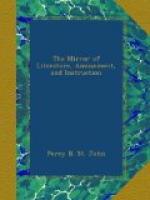are gone, whose infamous perversion of the writings
of other lawyers will cause no future Hale to leave
behind him orders expressly prohibiting the posthumous
publication of his legal MSS., lest the sanctity of
his name should be abused, to the destruction of those
laws, of which he had been long the venerable and
living image. An advocate of the present day need
not absolutely withdraw (as Sir Thomas More is reported
to have prudently done for a time) from his profession,
because the crown had taken umbrage at his discharge
of a public duty. It is, however, flattery and
self-delusion to imagine that the lust of power and
the weaknesses of human nature have been put down
by the Bill of Rights, and that our forefathers have
left nothing to be done by their descendants.
The violence of former times is indeed no longer practicable;
but the spirit which led to these excesses can never
die; it changes its aspect and its instruments with
circumstances, and takes the shape and character of
its age. The risks and the temptations of the
profession at the present day are quite as dangerous
to its usefulness, its dignity, and its virtue, as
the shears and branding-irons that frightened every
barrister from signing Prynne’s defence, or
the writ that sent Maynard to the Tower. The public
has a deep, an incalculable interest in the independence
and fearless honour of its lawyers. In a system
so complicated as ours, every thing must be taken at
their word almost on trust; and proud as we, for the
most part, justly are of the unsuspectedness of our
judges, their integrity and manliness of mind are,
of course, involved in that of the body out of which
they must be chosen. There is not a man living
whose life, liberty, and honour may not depend on
the resoluteness as well as capacity of those by whom,
when all may be at stake, he must be both advised
and represented in a court of justice.”
Our readers will easily recognise the great events
in the history of the law in England, to which the
reviewer alludes. Seldom have we read a more
masterly page; it would even form an excellent rider
to Mr. Brougham’s recent speech on the same
subject.
* * * *
*
SUPPERS.
It is a mere mistake to condemn suppers. All
the inferior animals stuff immediately previous to
sleeping; and why not man, whose stomach is so much
smaller, more delicate, and more exquisite a piece
of machinery? Besides, it is a well-known fact,
that a sound human stomach acts upon a well-drest
dish, with nearly the power of an eight-horse steam-engine;
and this being the case, good heavens! why should
one be afraid of a few trifling turkey-legs, a bottle
of Barclay’s brown-stout, a Welsh rabbit, brandy
and water, and a few more such fooleries? We appeal
to the common sense of our readers and of the world.
* * * *
*
TEA




